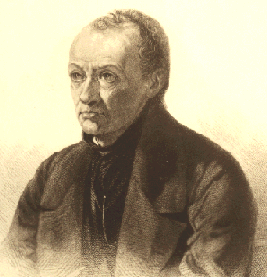
Auguste Comte
(1798-1857)

Comte, a French philosopher, was the founder of Positivism. Positivism is a philosophical system of thought maintaining that the goal of knowledge is simply to describe the phenomena experienced, not to question whether it exists or not. Comte sought to apply the methods of observation and experimentation, as was beginning to be used in the hard sciences, to a field that we now know as sociology. He believed that the solution of persistent social problems might be had by the application of certain hierarchical rules; he believed in the progress of mankind toward a superior state of civilization by means of the science of sociology, itself. (Marx and Hitler had similar notions.) In his later years Comte became involved in mysticism, to the point where Positivism became, in spite of its earlier claims to its scientific approach, more of a religion, than anything else.
Comte's cardinal position was this: "The greatest problem, then, is to raise social feeling by artificial effort to the position which in the natural condition is held by selfish feeling." To which Sir James Fitzjames Stephen responded, "To me this is like saying, the great object of mechanics is to alter the laws of gravitation." [See Liberty, Equality, Fraternity (1873) (University of Chicago Press, 1991) at p. 126.]
What underlies any government plan to "improve" the social condition is the philosophy of positivism. It aims to crush individuals in the pursuit of the impossible task of changing human nature. As John Stuart Mill was to write:
"M. Comte, in particular, whose social system, as unfolded in his Systeme de Politique Positive, aims at establishing (though by moral more than by legal appliances) a despotism of society over the individual, surpassing anything contemplated in the political ideal of the most rigid disciplinarian among the ancient philosophers." (On Liberty.)
